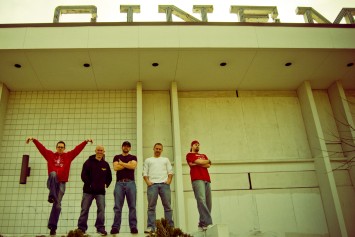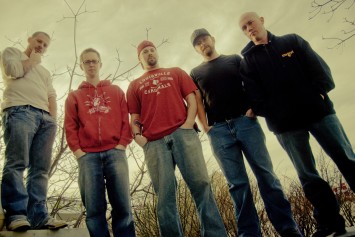

Dear friends, when will a fitter occasion offer us to recover the kingdom, or, if we are not strong enough, at least die in the attempt?
--Herodotus, The Histories, Book III: Thalia
Rage. It comes roaring at you like a summer thunderstorm, the kind that makes tornadoes drop from the sky and tear into trailer parks like brooms wielded by pissed-off giants. In comics, it is what turned a skinny scientist named Banner into a green musclebound giant that loved to smash stuff and speak in grunts and refer to himself in third person (and why did his shirts rip but not his pants? Did no growth ever occur below the belt line?). It's what metal bands bring to the stage in terms of sound and vision and message: slamming guitar chords that are as loud and forceful as Chuck Yeager punching through the sound barrier, drums pounding out jackhammer rhythms, each one a tiny explosion, and a vocalist that yells himself hoarse into a microphone that has the distortion levels on the mixing board cranked up past 10.
For all the criticism thrown their way (too loud, too screamy, too dark, too loud, you already said that. . .sorry, couldn't hear myself the first time), metal bands do provide a catharsis for the rage that burns in the blood. As if you could take everything that makes you absolutely mad (crappy and corrupt government, stupid bosses at work and insipid co-workers, or whatever's taken a Bunsen Burner to your ass on any particular day), or even just a buildup of daily annoyances that peck at you like an obnoxious parakeet, and just have a way to let it all out in a long, strong blast that won't hurt anybody or get you thrown in jail for assault.

It's a way to nuke the site from orbit, psychologically speaking. It's the only way to be sure.
And Surviving Thalia is a Louisville band that has the target in sight.
Their music? the machine-gun staccato drums, walls of thrashing guitar chords, bellowing vocals with enough anger in the lyrics to make stones bleed.

But the band members themselves? Five of them: one a psychology teacher, another an ex-Marine, four of them married, two with small children. Actually, five guys you'd probably find sitting with their wives or other friends in a booth at Tumbleweed.
"We're trying to shed some light on some things people may not really be aware of," said David "Sailor" Bryant, the band's vocalist. "People say that's a downfall because bands that bring that kind of message into the music normally hide it very well. Saying that, there are some comedy aspects as well. We do have a song called ‘Fish, Fight and F---,' and a sequel called ‘Guns, Trucks, Sex, and Ammo.' So we sometimes don't take ourselves too seriously.
"That's exactly it," said bassist Jason Koerner. "We're not the typical metal band that looks like a metal band. All of us have corporate jobs. But just because you work for one doesn't mean you have to think like one. We involve our personalities in it. We try to have fun."
The other personalities along for the fun are drummer Tim Owens, guitarist and vocalist Mike Taylor, and guitarist Dave Kesselbaugh, who recently joined the band.
And part of their fun is collaring you and forcing you to confront the clowns-running-the-circus mentality that passes for governance in Washington D.C. and elsewhere.
"My question? Is it not just theater and a dog-and-pony show," asked Sailor. "It's just a bunch of incompetence and a bunch of bad decisions. It's nothing more than theater and a good show for the average American, who think that they have their best interests at heart. And they don't."
The best visual summary of Surviving Thalia's message of a citizen's helplessness is on the cover's of their two CDs. On their first release , 2005's Welcome to Our America, a guy in a suit stands with his back to us, holding a gas nozzle to his head as he looks up at the station's marquee showing prices in the 12 dollar range. And on their latest effort, The Occupation of D.C., released late last month, the same guy in a suit watches, in a stop-motion triptych, as the old Humana/Farm Credit Bureau building next to the Second Street Bridge crumbles from an implosion. His fist is pumped in the air in the final panel as the structure has disappeared into a thick, billowy beige cloud of dust.
"When starting this particular project," Sailor said of the band, "I had developed a different kind of mindset. I wanted to make this project a little more about awareness. About how the world is really being run. From the first Matrix movie, I got the idea of the kind of band in wanted to have lyrically. [The character] Morpheus goes, ‘If you take this pill, you'll wake up in the morning to your same old boring life. You take this pill, you'll wake up, and I'll show you just how deep the rabbit hole goes.'"
"We're just trying to show people where the rabbit hole is."
In Greek mythology, Thalia was one of the nine muses, the set of divine women, daughters of Zeus and Mnemosyne (the goddess of memory), who were the sources of all creativity. Olivia Newton John was one of them in Xanadu, where she wore an off-the-shoulder taffeta dress and roller skates. The classical historian Herodotus named each chapter of his Histories after one of the muses. Thalia was the muse of comedy. Fitting for a band that is finding all the hilarity of how the world really is as they drag us through the rabbit hole with them. Just as The Comedian said in Watchmen: "It's all just a joke."
"Mike had a dream with the phrase Surviving Thalia in it," Koerner said, "and didn't know what the hell it meant. It sounded cool. We took it. One of the things I like about it personally is that it's really ambiguous. It's a notable name. People get interested in it. And it doesn't sound like a metal band. Cannibal Corpse? You know what they're gonna sound like."
"But there is a musical relevance to the name," Sailor added. "I researched the name Thalia. She was also known to be the mother of a tribe of castrated priests known as the Corybantes Tribe. They would be party crashers. They'd crash rituals, celebrations, play loud instruments and make a bunch of noise. Real pricks. Ruin everybody's time with a bunch of noise." And probably with high voices, too.
"I would be a party crasher, too, if I were castrated," said guitarist Taylor.
"You wouldn't be able to do anything about it once you crashed it," said Koerner.
"I'd drink all their booze," Taylor replied.
This manifestation of the mother of a party crashing group of castratos resulted from the remnants of the bands Nemesis (Koerner, Owens, and Taylor) and My Own Victim ("Sailor" Bryant), and the inclusion of the guitarist from Caustic (Kesselbaugh). The three from Nemesis have known each other since high school.
"We played the Toy Tiger together before we had drivers licenses," said Koerner. "Our parents used to take us to play all-ages shows at bars because we couldn't drive. Our band was called The Slackers, and we had our CD release party at the Toy Tiger when CDs were a new thing. We only made 50 of them and we sold out that night."
Sailor and the three from Nemesis encountered each other during a battle of the bands where he was a judge. On his scoresheet, they did not get the tenth of a point that would have bumped their score high enough to get third place. Sailor also judged Kesselbaugh's band Caustic.
"You said the most prickish thing about me," he told Sailor. "You said the guitar player doesn't need to try to take center stage from the singer. I remember reading out notes from the contest at our band practice the next week, and I said, ‘You motherf-----!' What did he want me to do. Stand there and stare at my shoes?"
"I was done," Sailor said. "After My Own Victim broke up, I didn't want to play this genre anymore. It took a lot out of me. I was in My Own Victim for seven, eight years, had a lot of fun. There were some pretty cool things I got to accomplish. But I was getting more into this swamp rock, writing it on acoustic instruments, and I got Mike to help get it out of me with a couple of recording sessions."
The result was Fill Dirt. Koerner later joined on bass.
"Then Mike came to me and asked if I'd like to do something a little heavier," Sailor said. "I said, ‘Let me see what your writing's like,' because they had done things in Nemesis that I had always loved. Certain subject matters drew me to them. They were great players. Had an incredible drummer. They didn't lack anything.
"We tried one song to see what it was like. It was ‘Sheep to Slaughter.'"
"They were trying to get me to play drums in Fill Dirt," Owens said. "I didn't want to play swamp rock. Then they said, ‘Hey, we're playing LRS Fest in front of 3000 people.' I said, okay, I'll do that."
Koerner continued the story. "So we did LRS Fest as Fill Dirt for about four or five songs. Then we introduced Surviving Thalia onstage during the set. We started playing and the place went crazy."
So the band did a changeup in music style onstage during one of the city's biggest music festivals and re-revealed themselves. Considering that the muse Thalia's symbol is a comedy mask, it shouldn't be surprising. Masks can be dropped to reveal the true self. Or put back on to conceal.
The revelation/concealment led to the release of Welcome to Our America in 2005 on ear X-tacy records, that label's first heavy metal CD. John Timmons, the label owner, who also happens to own a well-known music store in town with the same name, offered the band the same deal as others who want to put their music on his label: he puts up the money for the production and the band pays him back with the proceeds. With a few exceptions, some acts are not able to repay the costs completely. Timmons accepts that.
Surviving Thalia was able to pay him back with the profits earned at their CD release party.
Two years later, they began work on The Occupation of D.C. Unfortunately, because of a general industrywide slowdown in the business of selling records, plus a downturn in the overall economy, Timmons was not able to offer the same deal.
"John is a very, very good guy," Koerner said. "He did us a big favor with our first record. He regretfully declined us this time. So we're putting this one out on our own. It proved to us what a big favor he did for us the first one. This one was a stretch. But the best thing about being on ear X-tacy was that Welcome to Our America was all over the Internet. This one won't have that kind of availability."
"It'll be old school. Word of mouth," Taylor added.
"Yeah," Koerner continued. "We're back to selling it out of the trunk."
"But maybe that buzz from the first record will help," Taylor said.
After completing The Occupation of D.C., the band managed to recruit Dave Kesselbaugh as a second guitarist. Reluctant at first to join, he heard what the band had been doing with Occupation. It helped him make up his mind.
"I was sort of in between doing my own projects," he said, "trying to get something going and failing miserably at it. I heard their new record and thought I have to play this. I have to be a part of this. This was the heaviest, baddest, fastest stuff I'd ever heard."
"It's not noise," Koerner added. "It's very calculated. There is a method to the madness."
And part of the method to the madness involves the message.
"This record," Sailor said, "in my opinion, may be just a little bit too political sometimes. It's gonna kick people where they don't want to be kicked. It's going to be very painful right from the get-go. A million miles an hour right in your face."
"Look for a long time at what pleases you," wrote French author Collette, "and for a longer time at what pains you." The same goes for music. Igor Stravinsky's Rite of Spring is brutal and uneven, just like spring weather can be cold one week, then stormy or sunny the next. Improvisational jazz may sound like noise that's meant to scare away crows, but it challenges the boundaries of what music is.
Some metal music brings us a message of how uncaring and manipulative many in our nation's government can be, especially in these days when our representatives are shoveling money at failing institutions, then have the nerve to act shocked when they find out these institutions are not using their money as they're supposed to. They're comfortable in their self-righteousness, hiding comfortably in the rabbit hole
The music of Surviving Thalia blasts its way down that rabbit hole. And burns hot and bright so that we can see.